外研版(2019)必修第三册Unit 6 Disaster and hope Understanding Ideas 课件(共29张PPT)
文档属性
| 名称 | 外研版(2019)必修第三册Unit 6 Disaster and hope Understanding Ideas 课件(共29张PPT) |
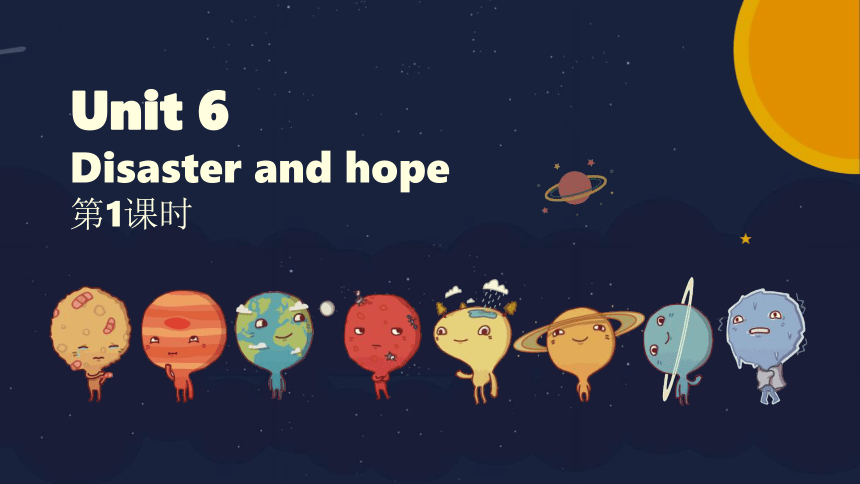
|
|
| 格式 | pptx | ||
| 文件大小 | 911.4KB | ||
| 资源类型 | 教案 | ||
| 版本资源 | 外研版(2019) | ||
| 科目 | 英语 | ||
| 更新时间 | 2023-11-29 18:01:18 | ||
图片预览

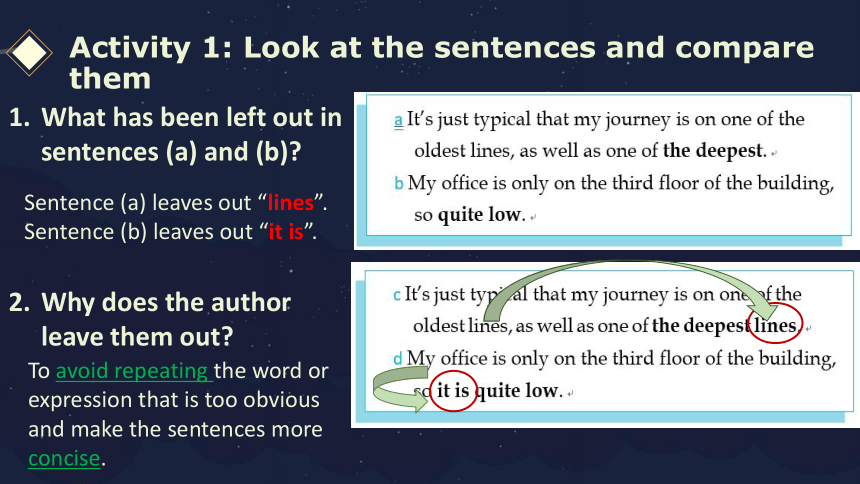
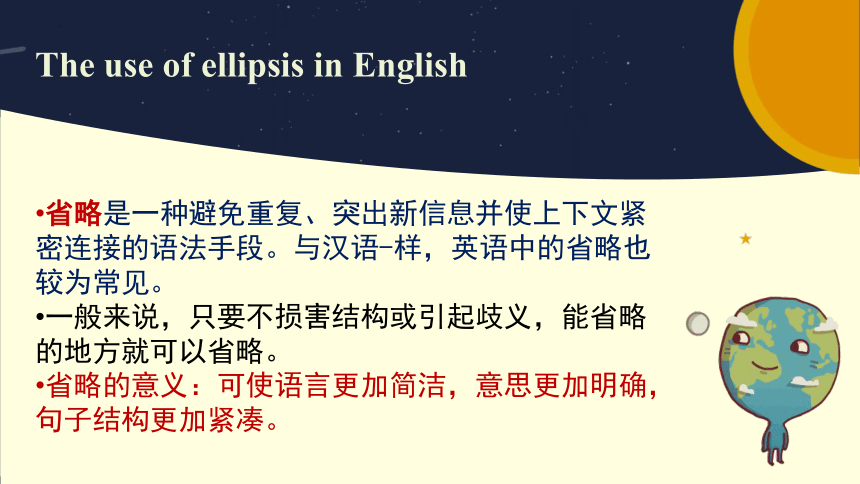
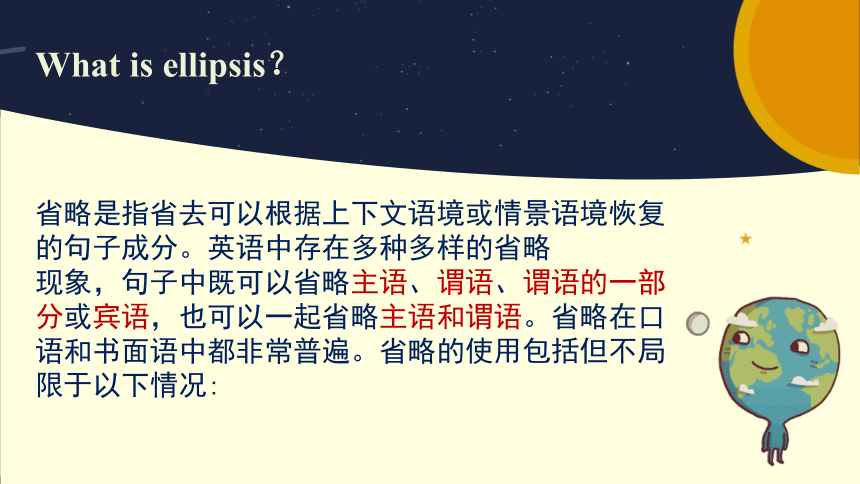
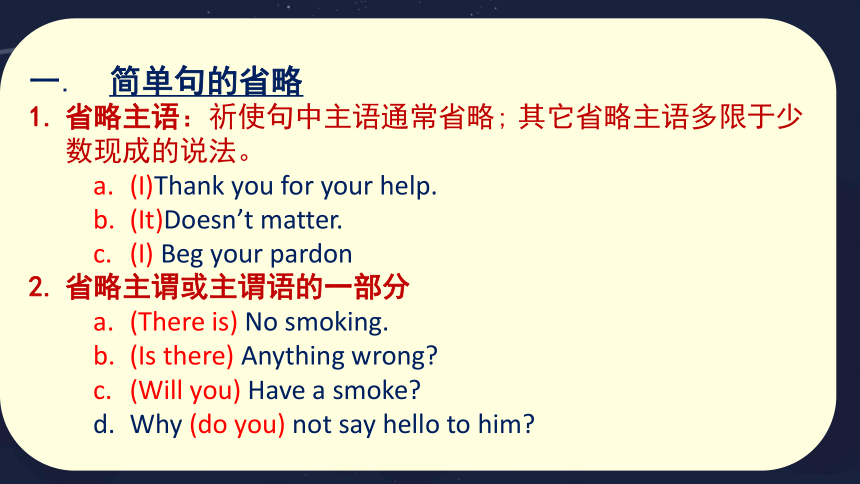
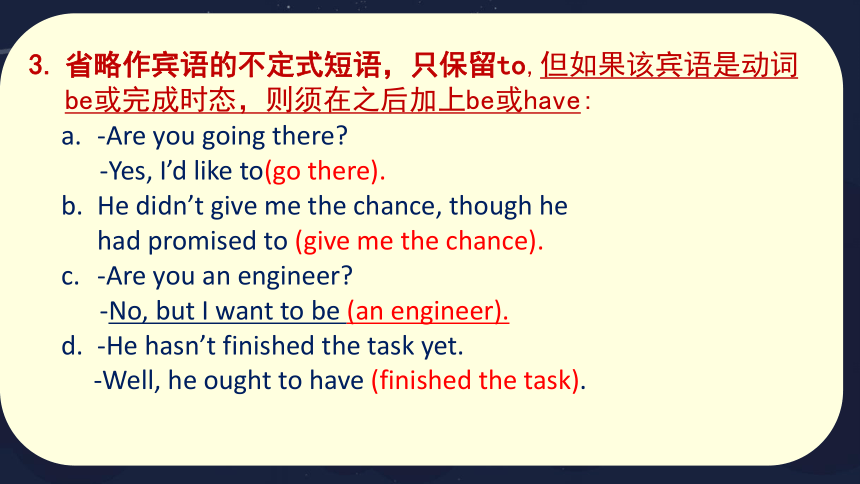
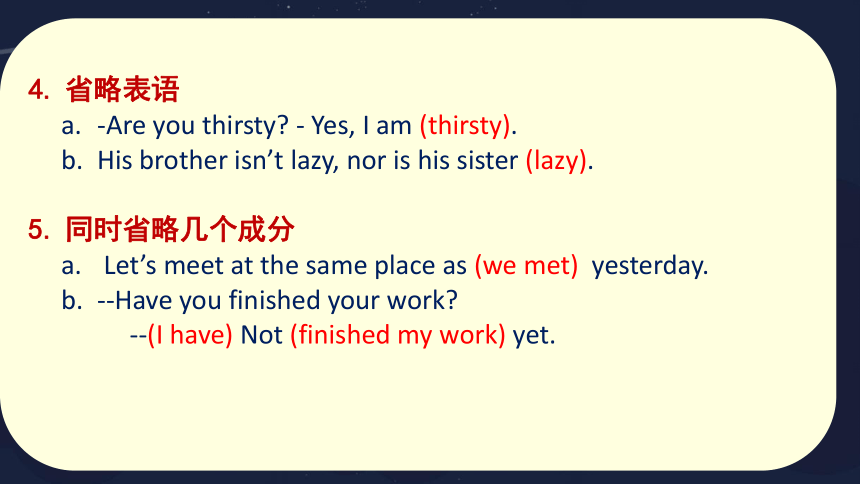
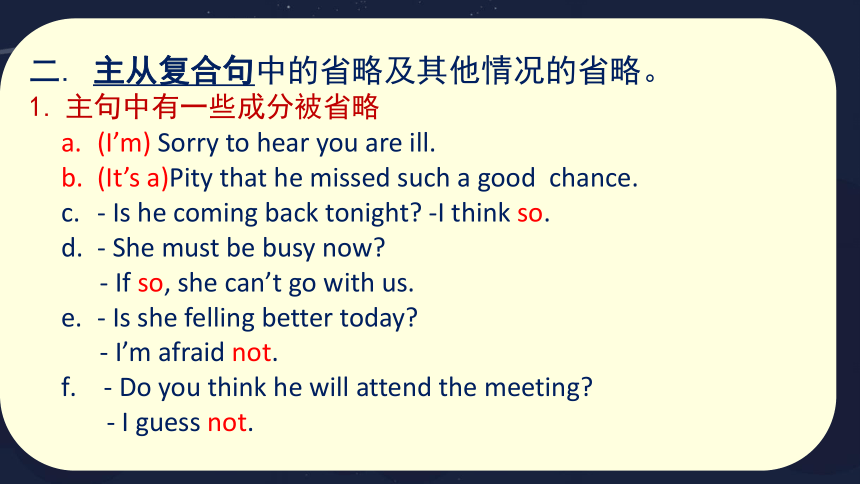
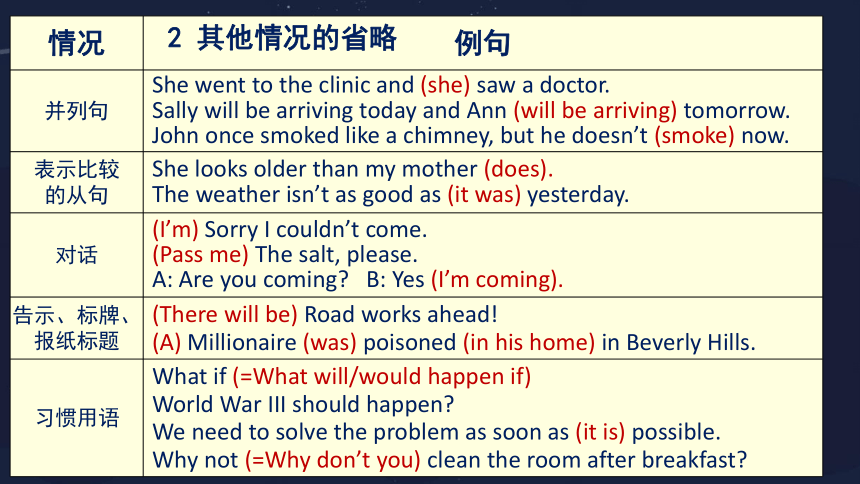
文档简介
(共29张PPT)
Unit 6
Disaster and hope
第1课时
Activity 1: Look at the sentences and compare them
What has been left out in sentences (a) and (b)
Why does the author leave them out
Sentence (a) leaves out “lines”.
Sentence (b) leaves out “it is”.
To avoid repeating the word or expression that is too obvious and make the sentences more concise.
The use of ellipsis in English
省略是一种避免重复、突出新信息并使上下文紧密连接的语法手段。与汉语-样,英语中的省略也较为常见。
一般来说,只要不损害结构或引起歧义,能省略的地方就可以省略。
省略的意义:可使语言更加简洁,意思更加明确,句子结构更加紧凑。
What is ellipsis?
省略是指省去可以根据上下文语境或情景语境恢复的句子成分。英语中存在多种多样的省略
现象,句子中既可以省略主语、谓语、谓语的一部分或宾语,也可以一起省略主语和谓语。省略在口语和书面语中都非常普遍。省略的使用包括但不局限于以下情况:
一. 简单句的省略
省略主语:祈使句中主语通常省略; 其它省略主语多限于少数现成的说法。
(I)Thank you for your help.
(It)Doesn’t matter.
(I) Beg your pardon
省略主谓或主谓语的一部分
(There is) No smoking.
(Is there) Anything wrong
(Will you) Have a smoke
Why (do you) not say hello to him
省略作宾语的不定式短语,只保留to,但如果该宾语是动词be或完成时态,则须在之后加上be或have:
-Are you going there
-Yes, I’d like to(go there).
He didn’t give me the chance, though he had promised to (give me the chance).
-Are you an engineer
-No, but I want to be (an engineer).
-He hasn’t finished the task yet.
-Well, he ought to have (finished the task).
省略表语
-Are you thirsty - Yes, I am (thirsty).
His brother isn’t lazy, nor is his sister (lazy).
同时省略几个成分
Let’s meet at the same place as (we met) yesterday.
--Have you finished your work
--(I have) Not (finished my work) yet.
二. 主从复合句中的省略及其他情况的省略。
主句中有一些成分被省略
(I’m) Sorry to hear you are ill.
(It’s a)Pity that he missed such a good chance.
- Is he coming back tonight -I think so.
- She must be busy now
- If so, she can’t go with us.
- Is she felling better today
- I’m afraid not.
- Do you think he will attend the meeting
- I guess not.
情况 例句
并列句 She went to the clinic and (she) saw a doctor.
Sally will be arriving today and Ann (will be arriving) tomorrow.
John once smoked like a chimney, but he doesn’t (smoke) now.
表示比较 的从句 She looks older than my mother (does).
The weather isn’t as good as (it was) yesterday.
对话 (I’m) Sorry I couldn’t come.
(Pass me) The salt, please.
A: Are you coming B: Yes (I’m coming).
告示、标牌、报纸标题 (There will be) Road works ahead!
(A) Millionaire (was) poisoned (in his home) in Beverly Hills.
习惯用语 What if (=What will/would happen if)
World War III should happen
We need to solve the problem as soon as (it is) possible.
Why not (=Why don’t you) clean the room after breakfast
2 其他情况的省略
Activity 2
Find out what words have been removed before or after the underlined words.
its ways (to forecast the weather)
dry period (that’s on the way)
more loudly (than usual)
(look) for birds
when and where (something bad is going to happen)
Activity 3: Remove words from the news report to make it more concise
The 8.1 magnitude earthquake that hit Nepal on 25 April 2015, was one of the worst earthquakes in history. On hearing the news, China was quick to start organising emergency aid.
International rescue teams soon began to arrive in the country. Amongst all the international heavy rescue teams, the China International Search and Rescue Team(CISAR) was the first international heavy rescue team to arrive. Consisting of 62 people, it not only included rescuers and medical staff, but also included earthquake experts. By early May, emergency aid worth 9.7 million US dollars had been donated by China, with a further round of emergency aid to follow.
改写句子:使用省略手段避免下面各句重复与冗赘。
Someone has used my phone, but I don’t know who has used it.
John worked hard but his brother did not work hard.
I have lazy students and hardworking students in my class.
--- Has he ever been abroad --- No, he has never been abroad.
If it is necessary, we will finish it ahead of time.
Give me your name and address, please.
It is well done.
He could answer the questions very well if he would answer the questions but he didn’t answer the questions.
Extreme weather conditions
What do you know about weather forecasting
Activity 7: Listen & Match
Activity 8
warm clothes
-15
fry meat on the road
get medical attention
hurricane
safe indoors
13
through floodwaters
25
wildfires
Activity 9
Work in pairs. Act out the conversation to talk about an extreme weather condition.
Student A: Turn to Page 83.
Student B: Turn to Page 86.
Activity 10
Work in pairs. Choose another extreme weather condition and have a similar conversation.
Unit 6
Disaster and hope
第2课时
翻译句子:
She decided to start picking up the house from the top down.
Industrial production is beginning to pick up.
We can pick up Mexican television.
Where did you pick up your English
She was going over to her parents' house to pick up some clean clothes for Oskar.
He picked his cap up from the floor and stuck it back on his head.
她决定开始彻底收拾那房子。
工业生产正在开始好转。
我们可以接收到墨西哥电视。
你是在哪儿学得英语?
她正要去父母家为奥斯卡取几件干净的衣服。
他从地板上捡起帽子,重新戴在头上。
pick up用法小结
(1)捡起,拾起
(2) (不费力地) 学会; 获得
(3) (开车) 接; 取
(4)接收 (信号或声音)
(5)(贸易、经济) 改善
(6)整理 (房间、房子)
(7)逮捕
Picking up a free newspaper at the Tube station, I see the title “Hot! Hot! Hot!”.
句意:在地铁站拿起一份免费报纸,我看到了标题
“热!热!热! ”。
Sure enough, going down the stairs and onto the platform is like jumping into a volcano that’s erupting. This, however, is nothing
compared to the train. Because there’s no air conditioning, the temperature inside the train can reach 35 degrees! It’s lovely at the beach, but not so when you’re wearing a suit and in a crowd of
passengers! I’m sure the passenger next to me and I are melting and becoming one! I had bacon and eggs for breakfast, and now I’m feeling
a bit sick - I hope I can make it to Bank station... I’ll avoid the feeling by thinking about work. I work in a tall, glass building. One very hot summer, the sun reflected off it and melted cars parked below! Will this happen again today
果不其然
这远远比不上… compare to sth:与…相比
指代____
一群…
熔化并融为一体
sick: want to vomit or throw sth up 恶心
make it:成功做成…
reflect off sth: (光)从…反射回来
后置定语
compare vt. 比较,对比
comparison n. 比较,对比
常用搭配:compare A with/to B 把A和B相比较
compare A to B 把A比作B
compared with/to 与……相比
People often _________ a teacher _______ a gardener who takes great care of various plants.
Film has a much shorter history, especially when ___________ such art forms as music and painting.
Recently a survey __________ prices of the same goods in two different supermarkets has caused heated debate among citizens.
_______________ the old house, the new one is like a huge palace.
compare to
compared to
comparing
Compared with
Yes, each summer in London definitely seems hotter than the last. I
suddenly feel a bit scared. Perhaps now is the time to start planning
for the future I should probably put my flat on the market and buy a
boat. That way, when the Thames rises and there is a flood in London,
I’ll still be able to get to work. But wait! Would I still have a workplace to go to My office is only on the third floor of the building, so quite low. I’ll speak with my manager about moving to the top floor. Most importantly, I will need to learn to swim! I’ll join a beginner’s swimming class immediately. Then I’ll be able to survive even when the tall buildings
are flooded.
是时候做某事了
put... on the market: 将…放在市场上售卖
definite; definition; define
rise: vi.(水位、价格等)上升
survival; survivor
She survived her husband by only a few years.她只比她丈夫多活了几年。
She is survived by her three children.她先于她的三个孩子离世。
They survived the crash/flood.他们在车祸/洪水中得以幸存。
Some strange customs have survived from earlier times.有些奇怪的风俗是从早年留存下来的
(vt.) 淹没
省略it is
Looking through my newspaper, I’m shocked by photos showing that a hurricane in Asia has destroyed a town. What’s more, heavy rain in Eastern Europe has caused landslides, and the heat across Southern
Europe has caused forest fires. Experts say this bad weather has
occurred due to climate change. News like this makes me feel nervous.
Now that it’s hard to avoid a disaster on Earth, perhaps I should start thinking about moving to space...
expert n. 专家,行家 adj. 内行的,专家的
an expert at/in/on 在……方面的专家/行家 Our headmaster is an expert in education.
be expert at/in(doing) 在(做)……方面在行 Linda is expert at finding useful information.
被…震惊
现在分词作伴随状语
现在分词作后置定语
席卷…的热浪
sth occurs (to sb)
移民太空
既然…
由于、因为、因……造成
所指的原因直接造成了句中所说的后果;除作状语和定语外,还可在be动词后作表语
thanks to 由于、多亏、幸亏
多表示正面的、好的原因或缘由,有时也用来表达不好的理由或讥讽的口气
owing to 因为、由于,也表示原因或理由
在句中多作状语,作状语时修饰整个句子,可以用逗号与句子隔开
because of 由于、幸亏
多表示正面的、好的原因或缘由
due to
例1:_________ a new EU directive, insecticide
labeling will be more specific.
例2: _________his gift of language learning,
Car1 Marx mastered fifteen languages in
his life time.
例3:The research institute refused to give up
the project merely ___________the lack
of skilled personnel.
例4:_______limitations on space, many
topics of actual substance have been left
out.
because of
Due to
Thanks to
Owing to
avoid vt.躲避,避开,避免
avoid doing sth.避免做某事
例1:You’d better avoid mentioning this topic.
你最好避免提及这个话题。
avoid后可接名词,代词或动名词做宾语,不能接动词不定式。有相同用法的动词有:consider, admit, imagine, mind, practice, suggest 等。
I crossed the road to avoid _________ (meet) him, but he saw me and came running towards me.
Be careful when you cross the road in the rush hour so as to avoid _____________ (knock) down by a car.
meeting
being knocked
“The next station is Bank!” comes the announcement. That’s my
destination. Stepping out of the station with a heavy heart, I suddenly
feel a fresh wind on my face. Well, maybe I have been worrying too
much. After all, it’s only 30 degrees outside!
报站声响起
现在分词作伴随状语
感到一阵清风扑面而来
毕竟
Unit 6
Disaster and hope
第1课时
Activity 1: Look at the sentences and compare them
What has been left out in sentences (a) and (b)
Why does the author leave them out
Sentence (a) leaves out “lines”.
Sentence (b) leaves out “it is”.
To avoid repeating the word or expression that is too obvious and make the sentences more concise.
The use of ellipsis in English
省略是一种避免重复、突出新信息并使上下文紧密连接的语法手段。与汉语-样,英语中的省略也较为常见。
一般来说,只要不损害结构或引起歧义,能省略的地方就可以省略。
省略的意义:可使语言更加简洁,意思更加明确,句子结构更加紧凑。
What is ellipsis?
省略是指省去可以根据上下文语境或情景语境恢复的句子成分。英语中存在多种多样的省略
现象,句子中既可以省略主语、谓语、谓语的一部分或宾语,也可以一起省略主语和谓语。省略在口语和书面语中都非常普遍。省略的使用包括但不局限于以下情况:
一. 简单句的省略
省略主语:祈使句中主语通常省略; 其它省略主语多限于少数现成的说法。
(I)Thank you for your help.
(It)Doesn’t matter.
(I) Beg your pardon
省略主谓或主谓语的一部分
(There is) No smoking.
(Is there) Anything wrong
(Will you) Have a smoke
Why (do you) not say hello to him
省略作宾语的不定式短语,只保留to,但如果该宾语是动词be或完成时态,则须在之后加上be或have:
-Are you going there
-Yes, I’d like to(go there).
He didn’t give me the chance, though he had promised to (give me the chance).
-Are you an engineer
-No, but I want to be (an engineer).
-He hasn’t finished the task yet.
-Well, he ought to have (finished the task).
省略表语
-Are you thirsty - Yes, I am (thirsty).
His brother isn’t lazy, nor is his sister (lazy).
同时省略几个成分
Let’s meet at the same place as (we met) yesterday.
--Have you finished your work
--(I have) Not (finished my work) yet.
二. 主从复合句中的省略及其他情况的省略。
主句中有一些成分被省略
(I’m) Sorry to hear you are ill.
(It’s a)Pity that he missed such a good chance.
- Is he coming back tonight -I think so.
- She must be busy now
- If so, she can’t go with us.
- Is she felling better today
- I’m afraid not.
- Do you think he will attend the meeting
- I guess not.
情况 例句
并列句 She went to the clinic and (she) saw a doctor.
Sally will be arriving today and Ann (will be arriving) tomorrow.
John once smoked like a chimney, but he doesn’t (smoke) now.
表示比较 的从句 She looks older than my mother (does).
The weather isn’t as good as (it was) yesterday.
对话 (I’m) Sorry I couldn’t come.
(Pass me) The salt, please.
A: Are you coming B: Yes (I’m coming).
告示、标牌、报纸标题 (There will be) Road works ahead!
(A) Millionaire (was) poisoned (in his home) in Beverly Hills.
习惯用语 What if (=What will/would happen if)
World War III should happen
We need to solve the problem as soon as (it is) possible.
Why not (=Why don’t you) clean the room after breakfast
2 其他情况的省略
Activity 2
Find out what words have been removed before or after the underlined words.
its ways (to forecast the weather)
dry period (that’s on the way)
more loudly (than usual)
(look) for birds
when and where (something bad is going to happen)
Activity 3: Remove words from the news report to make it more concise
The 8.1 magnitude earthquake that hit Nepal on 25 April 2015, was one of the worst earthquakes in history. On hearing the news, China was quick to start organising emergency aid.
International rescue teams soon began to arrive in the country. Amongst all the international heavy rescue teams, the China International Search and Rescue Team(CISAR) was the first international heavy rescue team to arrive. Consisting of 62 people, it not only included rescuers and medical staff, but also included earthquake experts. By early May, emergency aid worth 9.7 million US dollars had been donated by China, with a further round of emergency aid to follow.
改写句子:使用省略手段避免下面各句重复与冗赘。
Someone has used my phone, but I don’t know who has used it.
John worked hard but his brother did not work hard.
I have lazy students and hardworking students in my class.
--- Has he ever been abroad --- No, he has never been abroad.
If it is necessary, we will finish it ahead of time.
Give me your name and address, please.
It is well done.
He could answer the questions very well if he would answer the questions but he didn’t answer the questions.
Extreme weather conditions
What do you know about weather forecasting
Activity 7: Listen & Match
Activity 8
warm clothes
-15
fry meat on the road
get medical attention
hurricane
safe indoors
13
through floodwaters
25
wildfires
Activity 9
Work in pairs. Act out the conversation to talk about an extreme weather condition.
Student A: Turn to Page 83.
Student B: Turn to Page 86.
Activity 10
Work in pairs. Choose another extreme weather condition and have a similar conversation.
Unit 6
Disaster and hope
第2课时
翻译句子:
She decided to start picking up the house from the top down.
Industrial production is beginning to pick up.
We can pick up Mexican television.
Where did you pick up your English
She was going over to her parents' house to pick up some clean clothes for Oskar.
He picked his cap up from the floor and stuck it back on his head.
她决定开始彻底收拾那房子。
工业生产正在开始好转。
我们可以接收到墨西哥电视。
你是在哪儿学得英语?
她正要去父母家为奥斯卡取几件干净的衣服。
他从地板上捡起帽子,重新戴在头上。
pick up用法小结
(1)捡起,拾起
(2) (不费力地) 学会; 获得
(3) (开车) 接; 取
(4)接收 (信号或声音)
(5)(贸易、经济) 改善
(6)整理 (房间、房子)
(7)逮捕
Picking up a free newspaper at the Tube station, I see the title “Hot! Hot! Hot!”.
句意:在地铁站拿起一份免费报纸,我看到了标题
“热!热!热! ”。
Sure enough, going down the stairs and onto the platform is like jumping into a volcano that’s erupting. This, however, is nothing
compared to the train. Because there’s no air conditioning, the temperature inside the train can reach 35 degrees! It’s lovely at the beach, but not so when you’re wearing a suit and in a crowd of
passengers! I’m sure the passenger next to me and I are melting and becoming one! I had bacon and eggs for breakfast, and now I’m feeling
a bit sick - I hope I can make it to Bank station... I’ll avoid the feeling by thinking about work. I work in a tall, glass building. One very hot summer, the sun reflected off it and melted cars parked below! Will this happen again today
果不其然
这远远比不上… compare to sth:与…相比
指代____
一群…
熔化并融为一体
sick: want to vomit or throw sth up 恶心
make it:成功做成…
reflect off sth: (光)从…反射回来
后置定语
compare vt. 比较,对比
comparison n. 比较,对比
常用搭配:compare A with/to B 把A和B相比较
compare A to B 把A比作B
compared with/to 与……相比
People often _________ a teacher _______ a gardener who takes great care of various plants.
Film has a much shorter history, especially when ___________ such art forms as music and painting.
Recently a survey __________ prices of the same goods in two different supermarkets has caused heated debate among citizens.
_______________ the old house, the new one is like a huge palace.
compare to
compared to
comparing
Compared with
Yes, each summer in London definitely seems hotter than the last. I
suddenly feel a bit scared. Perhaps now is the time to start planning
for the future I should probably put my flat on the market and buy a
boat. That way, when the Thames rises and there is a flood in London,
I’ll still be able to get to work. But wait! Would I still have a workplace to go to My office is only on the third floor of the building, so quite low. I’ll speak with my manager about moving to the top floor. Most importantly, I will need to learn to swim! I’ll join a beginner’s swimming class immediately. Then I’ll be able to survive even when the tall buildings
are flooded.
是时候做某事了
put... on the market: 将…放在市场上售卖
definite; definition; define
rise: vi.(水位、价格等)上升
survival; survivor
She survived her husband by only a few years.她只比她丈夫多活了几年。
She is survived by her three children.她先于她的三个孩子离世。
They survived the crash/flood.他们在车祸/洪水中得以幸存。
Some strange customs have survived from earlier times.有些奇怪的风俗是从早年留存下来的
(vt.) 淹没
省略it is
Looking through my newspaper, I’m shocked by photos showing that a hurricane in Asia has destroyed a town. What’s more, heavy rain in Eastern Europe has caused landslides, and the heat across Southern
Europe has caused forest fires. Experts say this bad weather has
occurred due to climate change. News like this makes me feel nervous.
Now that it’s hard to avoid a disaster on Earth, perhaps I should start thinking about moving to space...
expert n. 专家,行家 adj. 内行的,专家的
an expert at/in/on 在……方面的专家/行家 Our headmaster is an expert in education.
be expert at/in(doing) 在(做)……方面在行 Linda is expert at finding useful information.
被…震惊
现在分词作伴随状语
现在分词作后置定语
席卷…的热浪
sth occurs (to sb)
移民太空
既然…
由于、因为、因……造成
所指的原因直接造成了句中所说的后果;除作状语和定语外,还可在be动词后作表语
thanks to 由于、多亏、幸亏
多表示正面的、好的原因或缘由,有时也用来表达不好的理由或讥讽的口气
owing to 因为、由于,也表示原因或理由
在句中多作状语,作状语时修饰整个句子,可以用逗号与句子隔开
because of 由于、幸亏
多表示正面的、好的原因或缘由
due to
例1:_________ a new EU directive, insecticide
labeling will be more specific.
例2: _________his gift of language learning,
Car1 Marx mastered fifteen languages in
his life time.
例3:The research institute refused to give up
the project merely ___________the lack
of skilled personnel.
例4:_______limitations on space, many
topics of actual substance have been left
out.
because of
Due to
Thanks to
Owing to
avoid vt.躲避,避开,避免
avoid doing sth.避免做某事
例1:You’d better avoid mentioning this topic.
你最好避免提及这个话题。
avoid后可接名词,代词或动名词做宾语,不能接动词不定式。有相同用法的动词有:consider, admit, imagine, mind, practice, suggest 等。
I crossed the road to avoid _________ (meet) him, but he saw me and came running towards me.
Be careful when you cross the road in the rush hour so as to avoid _____________ (knock) down by a car.
meeting
being knocked
“The next station is Bank!” comes the announcement. That’s my
destination. Stepping out of the station with a heavy heart, I suddenly
feel a fresh wind on my face. Well, maybe I have been worrying too
much. After all, it’s only 30 degrees outside!
报站声响起
现在分词作伴随状语
感到一阵清风扑面而来
毕竟
